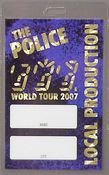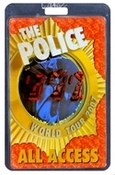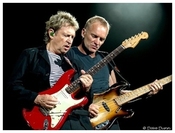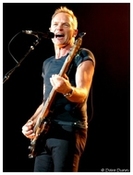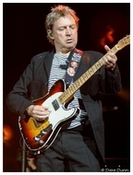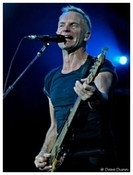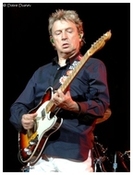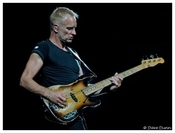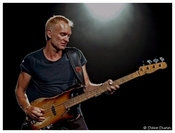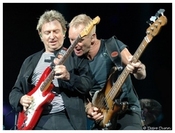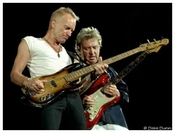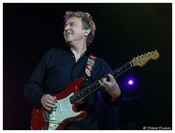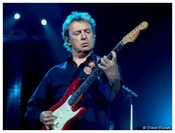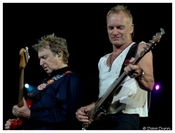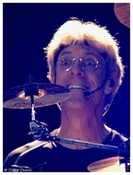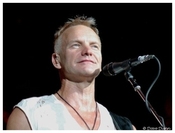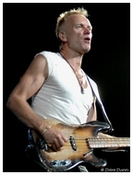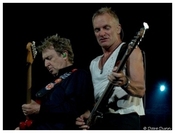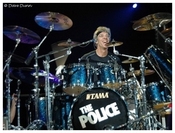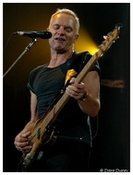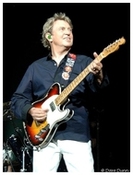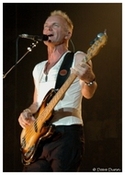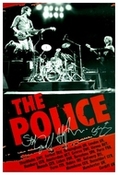
Criminally good music in a new form...
No, I couldn't help but put the title above - believe me: there were considerably more to choose from!
Because after almost two hours in the company of 14,500 others at a sold-out Globen in Stockholm (also the European premiere of the tour), the undersigned has no reason to call the police for having been robbed of memories or robbed of an experience.
Instead, I leave the white ball south of Gullmarsplan and walk on the full moon that shines up there because The Police chose not to guard their origins.
When The Police last played in Sweden in October 1983, the trio was the world's unquestionably biggest pop band at the time.
But after just five studio albums, singer, bassist and the band's central figure Sting wanted to do something completely different. Above all, he wanted to reconnect with his jazzy past.
At the upcoming solo concerts, The Police's unique hybrid of new wave-like pop reaction took on completely different forms.
An occasional compilation album has since been released, but questions about a reunion have been asked less and less frequently over the years, especially since Sting has been so aloof.
Until one day last fall he woke up and realized that the band was going on a major world tour.
The explanation is not in any urgent need for more money (one is rich, two are well-off). The answer is rather to be found in the book that was on sale in all the merchandise booths at the Globe: ''One train later''.
Guitarist Andy Summers' autobiography covers his long journey around the world, including his years with The Police. The picture he paints is brutally honest and certainly does not make Sting appear in a better light.
The tensions within the group with all the inflated egos combined with a lack of consensus on how the songs should actually be recorded and then performed live were actually what caused the band to break up.
It's not even wrong when two or in this case three people argue. But when people get a bit older, the afterlife - how people will remember something - starts to become increasingly important.
I had the privilege of seeing The Police live twice when they first started. Already in the first song 'Message In A Bottle' I notice the difference here 25 years later. The basics of the song are still there, as are the lyrics. Everything so that the audience, 90 percent of which were probably born between 1962 and 1968, will not be completely lost.
But the way they perform the set in general is often different (for example 'Every Breath You Take'), sometimes odd (as in 'Driven To Tears' and 'Walking In Your Footsteps') and now and then completely new (a magical 'Wrapped Around Your Finger').
The audience therefore collectively pricks up their ears more and more as it slowly but surely dawns on everyone that The Police have not actually come here to make a straight nostalgia trip in the sense of playing copies - they are rather making interpretations of their own songs.
And in this new-old collective, which was acclaimed towards the end of the concert, it is not Andy's spherical guitar loops or Sting's idiosyncratic singing style and ''free'' bass playing that is remembered, but drummer Stewart Copeland.
Suddenly, a fantastic percussionist appears in every sense who constantly drives the songs and thus the other two forward.
Then The Police also take off. This is what usually happens when the music is at the forefront and everything else - which is actually completely unnecessary - ends up further back.
And perhaps The Police (as well as Heaven & Hell earlier this year) are thus setting the trend for how future reunions not only should but should be done.
(c) Hallandsposten by Tony Balogh
August 30, 2007
SET LIST
- Message In A Bottle
- Synchronicity II
- Walking On The Moon
- Voices Inside My Head
- When The World Is Running Down You Make The Best Of What's Still Around
- Don't Stand So Close To Me
- Driven To Tears
- Truth Hits Everybody
- Hole In My Life
- Every Little Thing She Does Is Magic
- Wrapped Around Your Finger
- De Do Do Do, De Da Da Da
- Invisible Sun
- Walking In Your Footsteps
- Can't Stand Losing You
- Roxanne
- King Of Pain
- So Lonely
- Every Breath You Take
- Next To You

